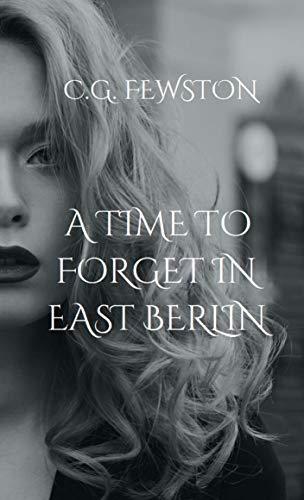
ESPIONAGE THRILLER
A Time to Forget in East Berlin
C. G. Fewston
Independently Published
Hardcover (ISBN 979-8-4924-3658-2), $17.99, 214 pgs.
January 4, 2022
A Time to Forget in East Berlin is not only an engrossing story of clandestine espionage, but it is also a testament to the lifestyle encountered in East Berlin at the height of the Cold War. Author C.G. Fewston does not color the story as anti-Communist or pro-Socialist but describes life in East Berlin with a matter-of-fact approach.
Set in the mid-1970s, the story occurs over a ten-month period. Told in first-person narrative, the narrator is John Lockwood, an American, but he is currently using the name Jacob Lockwood. John’s purpose in East Berlin is not given, but with the secret meetings with Italians and Russians, the reader can begin to form a conclusion.
The book has the feel of someone telling his story to a friend, perhaps over a cup of coffee or a dark, German beer. As John tells his story, he establishes an intimate relationship with the reader. One way this relationship is formed is by John reminiscing to earlier moments in his life that held special importance. For example, several times he refers to a moment in Vietnam when his friend died in his arms. Another example is his first experience with love – both found and lost.
Other flashbacks give the impression that John’s life is complicated. There are several references to a time in Iran when he was shot by a friend and then cared for by a KGB spy who brought him to East Germany. However, there are omissions from these flashbacks that allow the reader to ponder. For example, in the Iran instance, John does not indicate why he was there or what he was doing, but John’s experiences can be found in the first book of the trilogy A Time to Love in Tehran (2015).
Fewston further cements John’s intimate relationship with the reader by using Nina – John’s neighbor and love interest. Nina is twenty years John’s junior, and she is portrayed as someone desperately needing affection. She is an orphan and discontent with her life in East Berlin. She seeks an intimate relationship with John. This establishes John’s ultimate internal struggle: should he give in to this young love, knowing that it will likely end badly, or keep his distance from Nina’s heart?
Even though this is a first-person narrative, the protagonist’s emotions are not always direct. For example, at one point John looks into Nina’s eyes and describes what he sees: “A shape of truth that came from childish but noble beliefs we have agreed on as adults to call fairness, justice, honesty, happiness.” John later considers Nina, “…a modest perfection inside an immodest imperfection.”
It seems important to the author that John be viewed as a worldly character. There are many references to classical writers and poets, such as the French novelist Marcel Proust. Sometimes historic poems are included in the text in whole or in part. For example, when John is feeling small and alone against the largeness of a lake, he recalls Shelley’s Poem “Adonais.” The relevant portion of the poem is included in the text.
Fewston includes specific words – in passing – to further demonstrate John’s worldly view. For example, the term felix culpa is used to describe the extraordinary chaos that can ensue from a lack of harmony in life. There are also a plethora of German and some Italian phrases that help remind the reader of the nationality of characters. Usually, the phrase will be followed with text that allows the reader to understand the phrase. For example, in retelling Nina’s reaction to something John said, the author writes, “‘Arsch mit ohren,’ she said, calling me an ass with ears.”
Wistful phrases are often used to lend some of the story to poetic prose. One of these phrases, for example, describes John’s impression of sleep: “Sleep — that gentle passenger who follows you as faithfully as your shadow — what use was she to me now?”
As the author begins the ramp to the climax, about halfway through the book, he changes from monthly chapters to daily chapters. Rather than just telling of the highlights of a period, the daily structure makes the book hard to put down. This methodology increases the tension and quickens the pace of the story.
Overall, A Time to Forget in East Berlin provides insight to life behind the Iron Curtain and is told in a way that fully immerses the reader into the story.
The American novelist CG FEWSTON has been a Visiting Scholar at the American Academy in Rome (Italy), a Visiting Fellow at Hong Kong’s CityU, & he’s been a member of the Hemingway Society, Americans for the Arts, PEN America, Club Med, & the Royal Society of Literature. He’s also been a Fellow of the Royal Society of Arts, Manufactures and Commerce (RSA) based in London. He has a B.A. in English, an M.Ed. in Higher Education Leadership (honors), an M.A. in Literature (honors), and an M.F.A. in Creative Writing & Fiction. He was born in Texas in 1979.
You can read more about the author at www.CGFEWSTON.me & on Facebook @ cg.fewston
